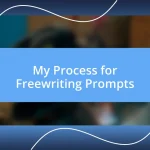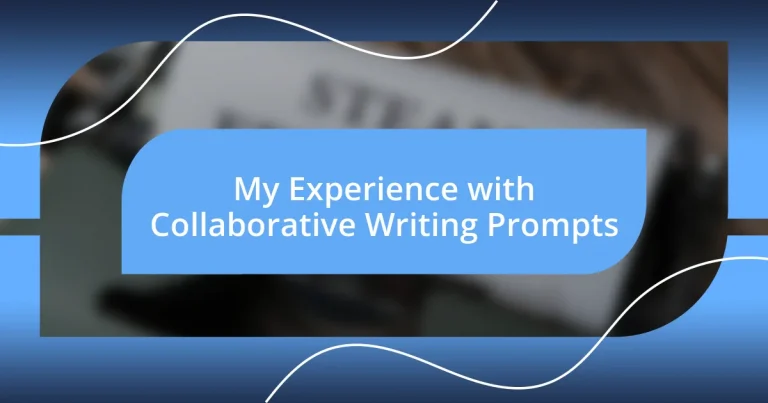Key takeaways:
- Collaborative writing fosters creativity, enhances diverse perspectives, and builds community among participants, as illustrated through shared experiences and insightful contributions.
- Effective collaboration requires clear roles, open communication, and leveraging tools to organize efforts and encourage constructive feedback, ultimately improving the writing process.
- Challenges in collaboration, such as differing ideas and missed deadlines, can be overcome through patience and open dialogue, transforming conflicts into opportunities for growth and richer narratives.
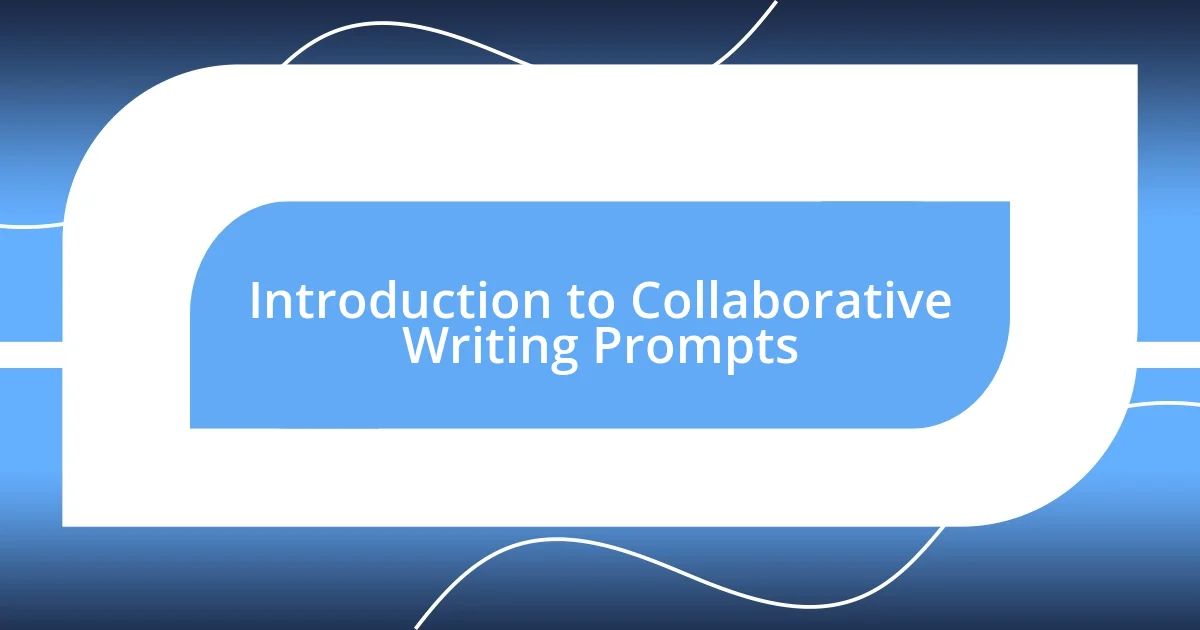
Introduction to Collaborative Writing Prompts
Collaborative writing prompts are a fantastic way to spark creativity and bring people together in the writing process. I remember the first time I joined a group focused on these prompts; the excitement in the room was palpable. Everyone was eager to share ideas, and I couldn’t help but wonder—how can a simple prompt inspire such a rich variety of responses?
When I think about collaborative prompts, I often reflect on how they can challenge our perspectives. For instance, one time we were tasked with completing a story about a lost treasure, and each participant took the narrative in wildly different directions. It struck me how these shared experiences not only enhanced our writing skills but also deepened our connections as a group. Haven’t you ever wondered how a single idea can transform when seen through different lenses?
What I find particularly intriguing is the way collaborative writing can foster a sense of community and support. By sharing our efforts and critiques, we create an environment where vulnerability thrives alongside creativity. The moment I received insights on my work from peers felt like a personal revelation—there’s real power in collaboration. Can you imagine the potential when diverse voices come together to create something unique?
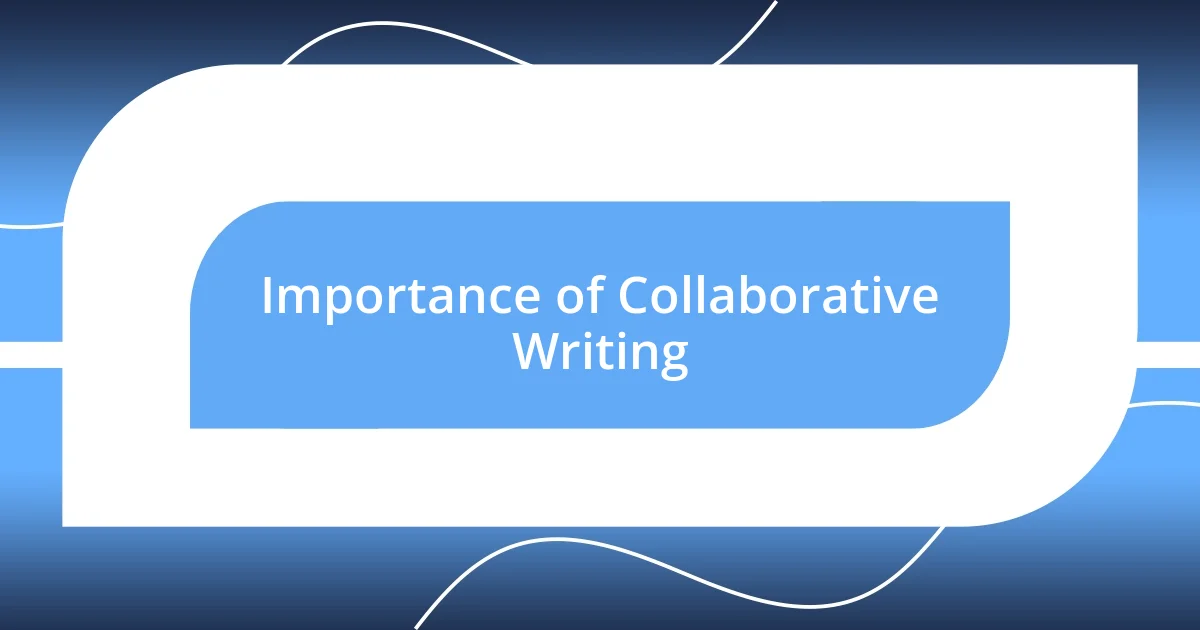
Importance of Collaborative Writing
Collaborative writing is crucial for fostering creativity and innovation. I remember a project where my group worked on a single narrative. Each contribution built on the last, resulting in a story richer than any of us could have crafted alone. This experience taught me that collaboration not only amplifies individual strengths but also highlights collective growth, which is invaluable.
Another aspect I appreciate is the diversity of thought that emerges in collaborative writing. During one session, we were brainstorming ideas for a script, and a quiet member suggested a twist that completely changed our direction. It was a moment that reminded me how varied perspectives can unveil solutions we might not have considered individually. Have you experienced that ‘aha!’ moment when someone else’s insight opens up new pathways in your writing?
Moreover, I’ve found that collaborative writing instills a sense of accountability and motivation. Not long ago, I participated in a prompt where we had to post our progress weekly. Knowing that others would read my work pushed me to refine my writing more than I usually would. It made me wonder—how do our commitments to one another enhance our individual pursuits?
| Benefits | Impact |
|---|---|
| Enhanced Creativity | Combining diverse ideas leads to richer content. |
| Strengthened Community | Collaboration fosters relationships and mutual support. |
| Accountability | Peer interaction motivates commitment to tasks. |
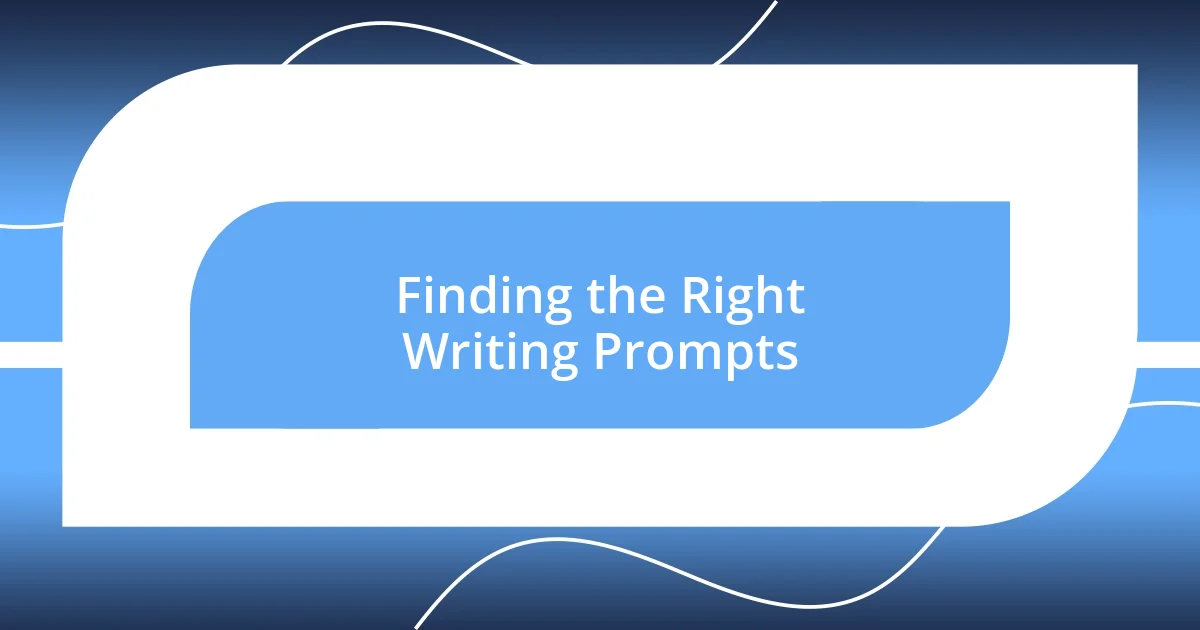
Finding the Right Writing Prompts
Finding the right writing prompts can truly make or break the collaborative experience. I’ve discovered that prompts should not only ignite creativity but also resonate with the participants’ interests and experiences. During one memorable workshop, we were given a prompt about “the last day on Earth.” The diverse interpretations that emerged were exhilarating—some chose to reflect on personal fears, while others painted vivid scenarios of adventure. It made me realize how personal themes can lead to deeper connections among writers.
When searching for prompts, consider the following aspects:
- Relevance: Choose themes that matter to the group to foster engagement.
- Open-Endedness: Prompts that allow for multiple interpretations encourage creative exploration.
- Challenge: Look for prompts that push boundaries, inviting participants to step outside their comfort zones.
- Inclusivity: Incorporate prompts that resonate with different backgrounds and perspectives, promoting diverse storytelling.
These factors have consistently helped me and my peers discover threads of commonality while celebrating our unique voices, enriching the collaborative writing process.
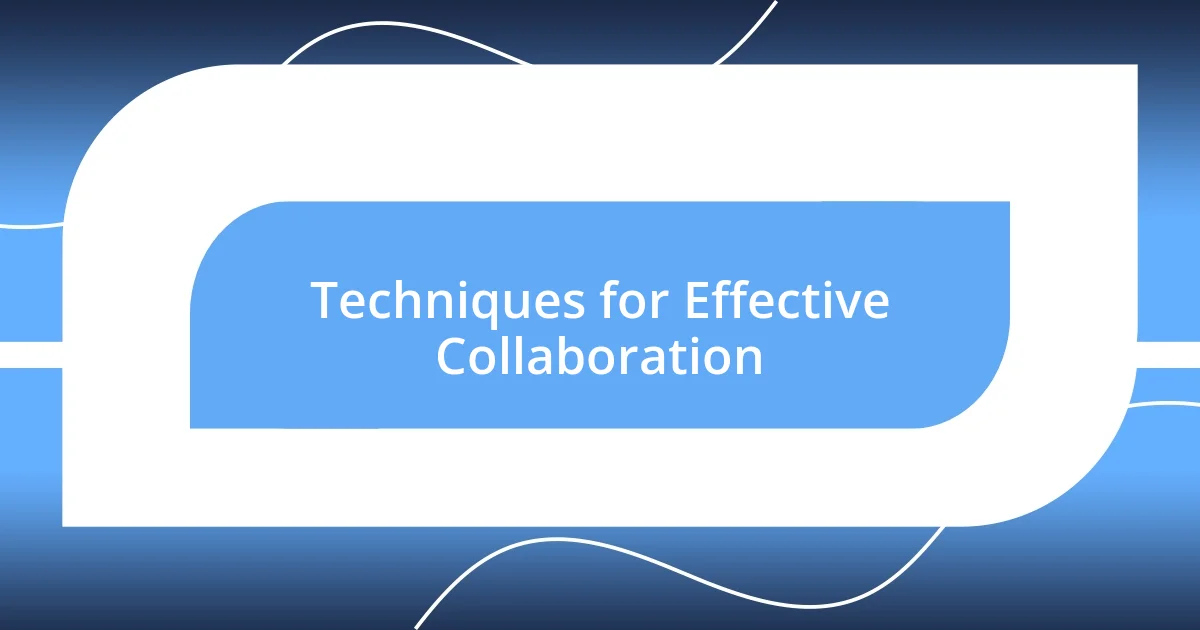
Techniques for Effective Collaboration
I’ve found that establishing clear roles within a collaborative writing group is essential for a smooth process. In one project, we divided tasks based on our individual strengths—someone took charge of research while another focused on editing. It became clear to me how this structure not only helped us stay organized but also minimized confusion. Have you ever been part of a project where everyone seemed to do everything? It can be chaotic, right?
Another technique I cherish is fostering open communication. I remember a time when we set aside a few minutes at the end of each meeting to share feedback on each other’s contributions. This openness not only built trust among us but also made it easier to share constructive criticism without the fear of hurting feelings. Wouldn’t you agree that feeling safe to voice your thoughts often leads to the most significant growth in a group?
Lastly, leveraging collaborative tools can significantly enhance the experience. We used platforms like Google Docs, which allowed us to see real-time edits and comments. I can’t stress enough how valuable it is to have your peers’ input as you jot down ideas. It’s as if we’re collectively breathing life into a story, making the writing process feel like an exciting journey rather than a solitary task. Have you ever tapped into technology to boost your collaboration? It can truly be a game-changer!
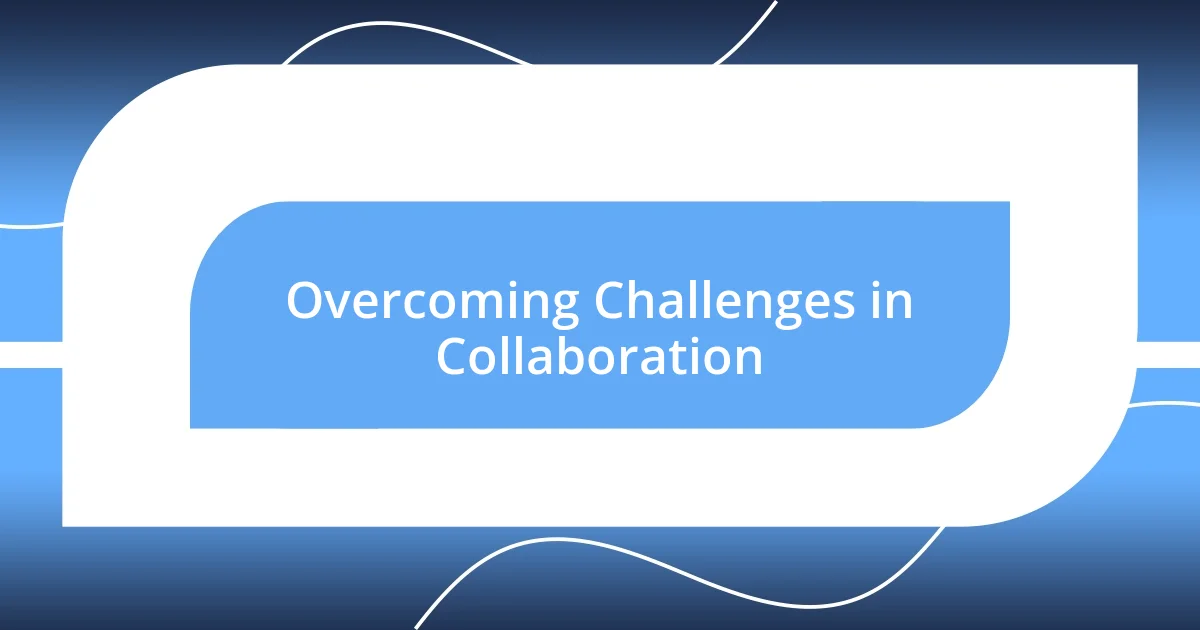
Overcoming Challenges in Collaboration
Collaboration isn’t always a smooth sail; it comes with its unique set of challenges. I remember a group project that hit a snag because one member consistently missed deadlines. At first, it was frustrating, but instead of pointing fingers, we took a step back. One of us suggested a casual check-in over coffee to discuss our progress and any roadblocks we were facing. Surprisingly, it turned out that they were overwhelmed with personal matters, and this open conversation helped us adjust our pace and support each other. Have you ever found that sometimes the simplest act of reaching out can clear the air?
Another hurdle I’ve encountered is dealing with conflicting ideas. In one instance, two writers had contrasting visions for a character. It was tense at first; I could feel the room’s energy shift. But then, we decided to hold a brainstorming session instead of forcing a compromise. By allowing everyone to present their thoughts and build on each other’s ideas, we crafted a character that beautifully blended both perspectives. It’s moments like these that remind me how brainstorming can transform friction into collaboration—doesn’t it feel refreshing when different ideas find common ground?
Lastly, I’ve learned that patience is a key ingredient in successful collaboration. In one project, we spent weeks refining a piece that just wasn’t hitting the mark. After countless revisions and discussions, I was beginning to feel disheartened. But rather than rush to finish, we took a breath and revisited our original intent. That pause allowed us to rediscover the heart of our writing. Sometimes, stepping back can lead to breakthroughs, don’t you think? Patience can often reveal the gems hidden under layers of uncertainty.
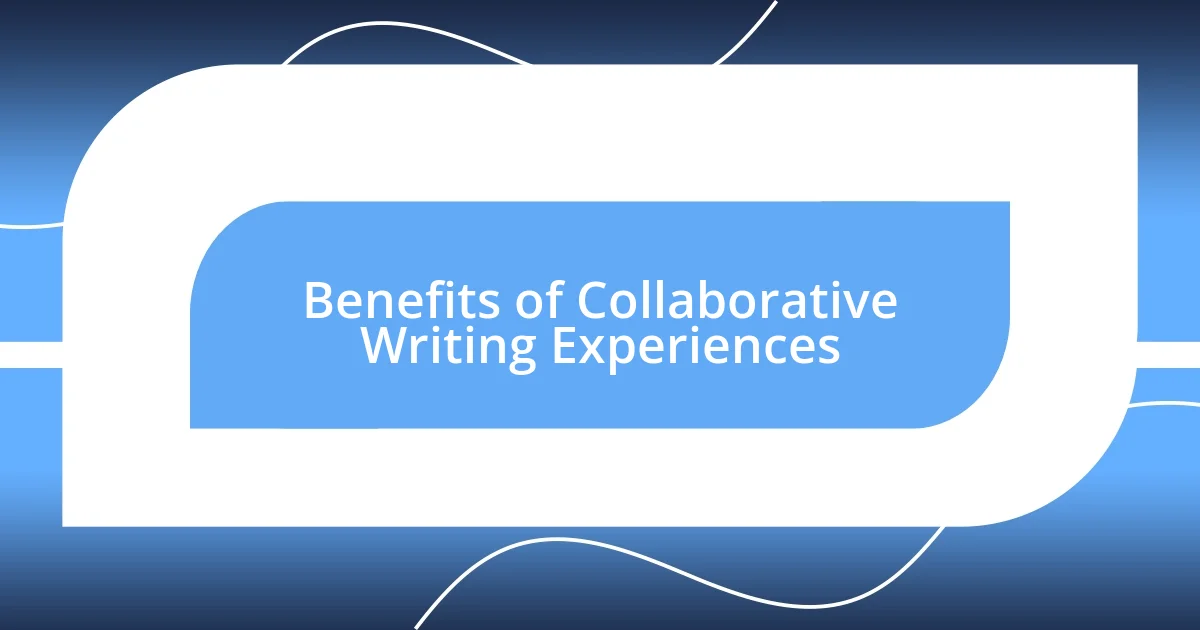
Benefits of Collaborative Writing Experiences
Collaborative writing experiences offer a treasure trove of benefits that can enhance both the writing process and the final product. For instance, I noticed how working with others sparked creativity among my teammates. In one project, we simply threw out wild ideas during brainstorming sessions. The energy was infectious, and it felt like we were building something bigger than ourselves. Have you ever felt the thrill of multiple minds converging on a single idea? That synergy can be so impactful.
Moreover, collaborating with others fosters accountability. I remember feeling a renewed commitment to my work when I knew a teammate was relying on me. This sense of responsibility not only pushed me to meet my deadlines but also encouraged me to put forth my best effort. It’s an interesting dynamic—how does knowing someone else is counting on you change your approach to tasks? I’ve found that it often leads to higher quality contributions.
Lastly, one of the most rewarding aspects of collaborative writing is the opportunity for personal growth. I can’t tell you how many times I’ve learned something new from my peers. One experience stands out where a fellow writer introduced me to different narrative techniques. I initially felt intimidated, but they turned mentoring into a delightful exchange. Suddenly, our discussions illuminated various paths in the writing process, and I left feeling richer in knowledge. Isn’t it remarkable how collaboration can transform our understanding and capabilities?

Conclusion and Future Insights
As I reflect on my journey through collaborative writing, I can’t help but feel grateful for the growth it has spurred in me. Each experience brought its own set of lessons, like the time I learned to embrace constructive criticism more openly. I used to dread feedback, but now I see it as a tool for improvement. Doesn’t it feel liberating to reframe challenges as opportunities for growth?
Looking ahead, I see incredible potential in continuing to harness collaborative prompts. Imagining myself working on diverse projects with fresh voices excites me. I believe the next wave of collaboration could involve even more digital tools that enhance real-time creativity and connection. Have you considered how technology might reshape the way we collaborate? I think it’s thrilling to envision a future where collaboration is not just about working together but also about co-creating in ways we haven’t yet explored.
Ultimately, the power of collaborative writing lies in its ability to connect individuals from various backgrounds, each bringing unique insights to the table. I fondly recall a particular group project where a member’s cultural perspective transformed our narrative. It’s a vivid reminder of how collaboration broadens our horizons. Isn’t it amazing how one person’s story can resonate and inspire a whole different direction? I truly believe that the best is yet to come as we continue to learn from one another in this vibrant tapestry of voices.







